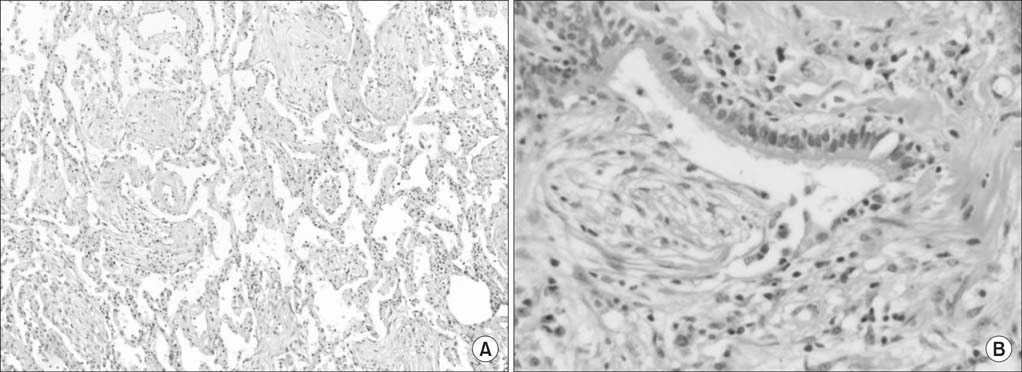Tuberc Respir Dis.
2014 Dec;77(6):262-265. 10.4046/trd.2014.77.6.262.
A Case of Organizing Pneumonia Associated with FOLFIRI Chemotherapy
- Affiliations
-
- 1Department of Internal Medicine, Konkuk University Hospital, Konkuk University School of Medicine, Seoul, Korea. sjkim@kuh.ac.kr
- KMID: 1842994
- DOI: http://doi.org/10.4046/trd.2014.77.6.262
Abstract
- The combination chemotherapy of irinotecan with 5-fluorouracil and leucovorin (FOLFIRI regimen) was recently proven to be beneficial in patients with advanced colorectal cancer. Pulmonary toxicity is very rare in adverse effects of irinotecan. No case of organizing pneumonia (also known as bronchiolitis obliterans organizing pneumonia) associated with FOLFIRI chemotherapy has been reported. We experienced a case of a 62-year-old man who presented persistent dry cough and progressive dyspnea after receiving chemotherapy with FOLFIRI regimen. After surgical lung biopsy, the patient was diagnosed with FOLFIRI chemotherapy-induced organizing pneumonia which was successfully treated with steroid therapy.
MeSH Terms
Figure
Reference
-
1. Haggar FA, Boushey RP. Colorectal cancer epidemiology: incidence, mortality, survival, and risk factors. Clin Colon Rectal Surg. 2009; 22:191–197.2. Douillard JY, Cunningham D, Roth AD, Navarro M, James RD, Karasek P, et al. Irinotecan combined with fluorouracil compared with fluorouracil alone as first-line treatment for metastatic colorectal cancer: a multicentre randomised trial. Lancet. 2000; 355:1041–1047.3. de Gramont A, Figer A, Seymour M, Homerin M, Hmissi A, Cassidy J, et al. Leucovorin and fluorouracil with or without oxaliplatin as first-line treatment in advanced colorectal cancer. J Clin Oncol. 2000; 18:2938–2947.4. Pozzo C, Basso M, Cassano A, Quirino M, Schinzari G, Trigila N, et al. Neoadjuvant treatment of unresectable liver disease with irinotecan and 5-fluorouracil plus folinic acid in colorectal cancer patients. Ann Oncol. 2004; 15:933–939.5. Fukuoka M, Niitani H, Suzuki A, Motomiya M, Hasegawa K, Nishiwaki Y, et al. A phase II study of CPT-11, a new derivative of camptothecin, for previously untreated non-small-cell lung cancer. J Clin Oncol. 1992; 10:16–20.6. Pasetto LM, Jirillo A, Iadicicco G, Rossi E, Paris MK, Monfardini S. FOLFOX versus FOLFIRI: a comparison of regimens in the treatment of colorectal cancer metastases. Anticancer Res. 2005; 25:563–576.7. Shimura T, Fuse N, Yoshino T, Minashi K, Tahara M, Doi T, et al. Clinical features of interstitial lung disease induced by standard chemotherapy (FOLFOX or FOLFIRI) for colorectal cancer. Ann Oncol. 2010; 21:2005–2010.8. Pitot HC, Wender DB, O'Connell MJ, Schroeder G, Goldberg RM, Rubin J, et al. Phase II trial of irinotecan in patients with metastatic colorectal carcinoma. J Clin Oncol. 1997; 15:2910–2919.9. Yoshii N, Suzuki T, Nagashima M, Kon A, Kakihata K, Gemma A. Clarification of clinical features of interstitial lung disease induced by irinotecan based on postmarketing surveillance data and spontaneous reports. Anticancer Drugs. 2011; 22:563–568.10. Takano T, Ohe Y, Kusumoto M, Tateishi U, Yamamoto S, Nokihara H, et al. Risk factors for interstitial lung disease and predictive factors for tumor response in patients with advanced non-small cell lung cancer treated with gefitinib. Lung Cancer. 2004; 45:93–104.11. Ando M, Okamoto I, Yamamoto N, Takeda K, Tamura K, Seto T, et al. Predictive factors for interstitial lung disease, antitumor response, and survival in non-small-cell lung cancer patients treated with gefitinib. J Clin Oncol. 2006; 24:2549–2556.12. Michielin O, Udry E, Periard D, Matzinger O, Lobrinus JA, Stupp R. Irinotecan-induced interstitial pneumonia. Lancet Oncol. 2004; 5:322–324.13. Madarnas Y, Webster P, Shorter AM, Bjarnason GA. Irinotecan-associated pulmonary toxicity. Anticancer Drugs. 2000; 11:709–713.
- Full Text Links
- Actions
-
Cited
- CITED
-
- Close
- Share
- Similar articles
-
- A Case of Spontaneous Remission Organizing Pneumonia after Resection of Thymoma
- Radiologically Suspected Organizing Pneumonia in a Patient Recovering from COVID-19: A Case Report
- Idiopathic Interstitial Pneumonias: Radiologic Findings
- A case of idiopathic bronchiolitis obliterans organizing pneumonia
- A Case of Secondary Organizing Pneumonia Associated with Endobronchial Actinomycosis




